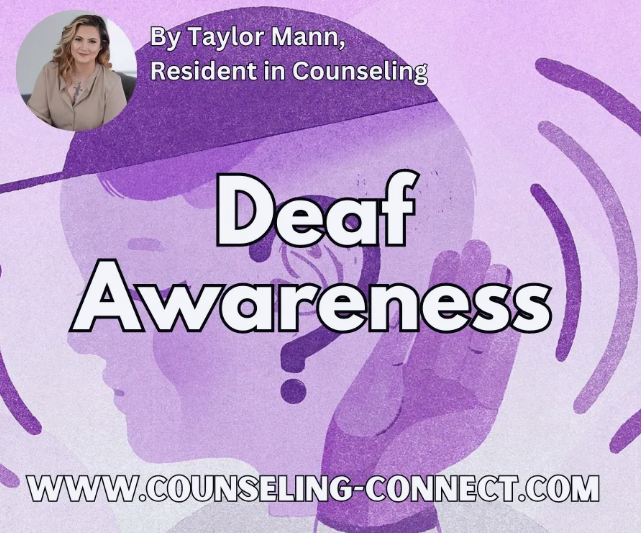By Taylor Mann, Resident in Counseling
Today, we delve into the world of Deaf culture with a focus on inclusivity and respect. Our discussion explores the intricate relationship between deafness, identity, and mental well-being, shedding light on the diverse experiences that shape the deaf community.
The National Deaf Center has a commitment to inclusivity. By using the term “deaf” inclusively, we acknowledge the wide range of identities within the deaf community, including those who identify as deaf, deaf-blind, deaf-disabled, hard of hearing, or late-deafened. This inclusive approach celebrates the diversity of experiences and fosters unity within the community.
The concept of identity is unique within the deaf community. Deaf culture is a culture in the same way that many ethnic groups have their own history, language, and traditions, which signify their membership in the group. For those who belong to Deaf culture in the United States, American Sign Language is often their first language and they grow up with an understanding of themselves, which differs from mainstream society. For example, some deaf individuals do not see their deafness as a disability to be “fixed” but rather, they celebrate it as an integral part of who they are and how they fit in their community.
While some people fully embrace Deaf culture, others may identify only partially or not at all. Because of modern technology, cochlear implants can restore up to 80% of hearing loss. As a result, there has been a decrease in the deaf population. More than 40% of American parents forego learning sign language and opt to get their cochlear implants for their children. Some people worry that because of these changes, Deaf culture is disappearing and the unique language and history of this community will be lost. (https://www.youtube.com/watch?v=wLDM2pPYoOs)
Identity is a personal journey, influenced by upbringing, personal beliefs, and exposure to Deaf culture. As individuals grow, their understanding of themselves and their community may evolve. While some experiences may be shared among community members, others may be unique to specific individuals. Recognizing and honoring this diversity fosters an environment where every voice is valued and respected.
It’s also important to consider the language we use. Terms like “hearing impaired,” “deaf-mute,” and “deaf and dumb” are viewed as offensive within the deaf community, as they can carry negative connotations and perpetuate misconceptions. Instead, we advocate for language that respects the autonomy and dignity of deaf individuals, fostering mutual respect and understanding.
Deaf awareness and identity highlights the importance of inclusivity, respect, and understanding within the deaf community. By embracing diversity and advocating for respectful language, we create a community where all individuals can thrive and be valued for their unique experiences and perspectives.
Source: https://nationaldeafcenter.org/resources/deaf-awareness/

